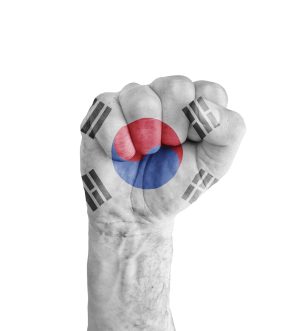In a shocking move, South Korean President Yoon Suk-yeol declared martial law on the night of December 3, alleging that the opposition Democratic Party, which controls the National Assembly, was guilty of “plotting sedition” and “a clear act against the state.”
“I declare martial law to eradicate pro-North Korean forces and protect the free constitutional order,” Yoon said in a televised announcement from the Presidential Office in Seoul around at 10:40 p.m. KST.
He vowed to “root out the anti-state forces,” saying martial law was “an inevitable measure to guarantee the freedom and safety of the people, as well as the sustainability of the country, from the activities of anti-state forces seeking to overthrow the system.”
Yoon claimed that the DP’s use of its legislative majority to impeach government officials and stymie the budget were “anti-state,” and implied, without offering evidence or details, that supposed “pro-North Korean” sentiments were behind the DP’s actions. The party has also been pushing for investigations of Yoon’s wife for several corruption scandals and has tried to impeach his cabinet members, who have been accused of committing illegal acts.
Lee Jae-myung, the leader of the DP, called his party members to enter the building of the National Assembly immediately after Yoon declared martial law. It has been reported that the building of the National Assembly was closed by the police. Only the members of the National Assembly seem to have been able to enter the building, according to live coverage by domestic media outlets. As midnight approached, the military officers of the martial law command were were reportedly seeking to enter the National Assembly as well.
According to the constitution, the president should lift martial law if a majority of members in the National Assembly passes an emergency act demanding him to lift the declaration. Thus, Woo Won-shik, the speaker of the National Assembly, is discussing how to hold a plenary session to respond to Yoon’s declaration of martial law. However, Yoon is unlikely to honor such an act from the National Assembly, given his accusation that DP lawmakers are “anti-state.”
Update: At around 1:00 a.m. KST on December 4, South Korea’s National Assembly passed a resolution requesting that martial law be lifted. 190 of the assembly’s 300 lawmakers were present, from both the ruling and opposition parties; all of them voted in favor of the resolution.
Second update: A little past 4:20 a.m. KST, Yoon said he would “lift the martial law and accept the National Assembly’s demand.” The president also said that he had ordered troops to withdraw from the streets of the capital.
The first edict under martial law was declared by the Army Chief of Staff as of 11:00 p.m. KST. According to the edict, any kind of political activity is banned. All media and publications are to be controlled by the martial law command. The ban on political activities includes a prohibition on marches and strikes. As a result, all medical personnel who left their hospitals under South Korea’s doctors’ strike, which has been ongoing since February, will need to return to their workplace in 48 hours.
Violators of the edict will be subject to arrest, detention, and search and seizure – all without a warrant. Woo has asked the police and the military not to make any dangerous moves. Domestic media outlets are reporting that people are marching to the National Assembly, but as of this writing there have been no clashes with the police or the military.
The latest reports said that helicopters and tanks were mobilizing to the National Assembly.
Han Dong-hoon, the leader of the ruling People Power Party (PPP), released a short statement saying Yoon’s declaration was wrong and he would defend the country alongside the South Korean people. However, as he is not a member of the National Assembly, Han may not be able to control his party effectively and keep that promise, given the circumstances.
Yoon has faced rock-bottom approval ratings in recent weeks. In Gallup Korea’s latest survey, conducted between November 26 and 28, just 19 percent approved of Yoon’s performance versus 72 percent who disapproved. There are many reasons for the public discontent, but one has been concern about Yoon’s tendency to prioritize his own power over values like a free press. The declaration of martial law escalates the situation in South Korea to an alarming level.
As the public soured on Yoon, calls have grown for him to be removed from office – including by impeachment proceedings. Previously, legal experts held that such calls were premature, as Yoon had not committed “major violations of the law.” His declaration of martial law could tip the scales, but any impeachment motion would need the support of at least eight members of the PPP.
South Korea is not that far removed from a military dictatorship, which was only overturned in 1987. Since then, the possibility of a return to martial law has been a recurring concern – especially during the sensitive period preceding former President Park Geun-hye’s impeachment. As mass protests mounted against the president – like Yoon, also affiliated with South Korea’s conservative party – the Defense Security Command crafted a controversial plan to declare martial law to keep Park in office. The plan was never put in motion, but its mere existence sparked outrage from South Koreans.
With calls growing for Yoon’s impeachment, opposition leader Lee Jae-myung had warned in September that the president might be planning to declare martial law. At the time, the Presidential Office called Lee’s comment “a baseless political attack that defies common sense.”
This is a developing story.

































